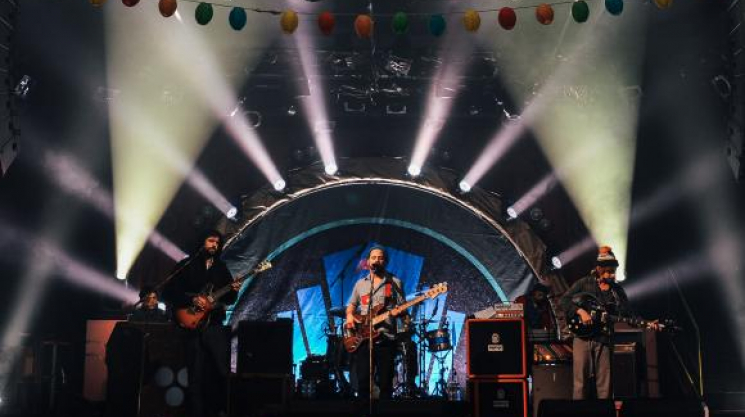
Thu, 04/09/2015 - 22:10 by Natasha Neale
For a moment it was no longer the dead of winter, and the Music Hall of Williamsburg was transformed into a tropical luau, with vines hanging from banisters and fruit nestled high above, where the bannister met the ceiling. And then, of course, there was the pink flamingo at the center of the stage. The flamingo reminded you why you were there in the first place: the release of Dr. Dog’s first live album, Live At A Flamingo Hotel. They would be performing for eight nights in New York City, and then continuing onward for a full-on U.S. tour through April.
Julia Edelman sat backstage with Scott McMicken and Toby Leaman, who have been friends since the eighth grade. Scott speaks cautiously, and Toby exudes an air of boyish excitement. They discussed the beginnings of Dr. Dog, reaching a fuller, more collaborative spirit, and psychedelic swamps.
I. COFFEE GROUND BEARDS
What was your first show?
Scott McMicken: As Dr. Dog? Our friend had a birthday party and we played in her bathroom.
Toby Leaman: She had two bathrooms, so you could still use the other bathroom and come upstairs and see the Dr. Dog show.
So were you playing in the bathtub?
SM: Yeah! We all had white clothes on and coffee ground beards. You put Vaseline on your face in the shape of a beard and then throw coffee grounds at it and it just sticks there so you have these weird little, tight beards.
And then people took you seriously after that?
SM: [Laughs] Oh yeah, they took us extremely seriously.
Would you say that your dynamic and style as a band has changed a lot over time?
SM: Thinking back, I don’t ever remember feeling like the band wasn’t operating at its fullest collaborative spirit. But then with each person that’s joined, they’ve improved upon that, and all of a sudden you stand back and realize things are working so much better.
II. A RARE WINDOW
Why did you decide to make a live album?
SM: It’s been a point of conversation for many years now, but it just came up again and at that point the band’s confidence in a live show had really grown to a point where we’re like “Okay, we can handle this.” Whereas prior to that, the idea of listening to yourself recorded live seemed like a really terrifying, uncomfortable thing to do. But now our style of playing together has become a lot more nuanced.
Do you think a live album changes your relationship with the audience? That it makes the whole experience of listening to your music feel more tangible, or closer, somehow?
SM: Yeah, I think so. Our identity as a live band is a huge part of what the band has become.
TL: But the focus on the live record is more band-driven than audience-driven. There’s audience on there, obviously, but it’s not presented as a single show or event. It’s what the band sounds like live. The audience is not the be-all, end-all of the record.
Right. And I feel like a lot of great live albums started coming out around the early 1970s from The Who, Velvet Underground, and Bob Dylan, among many others. Is this a sort of nod to that era?
SM: Interestingly enough, it kind of is. A guy who works at our label, Andy, remembered growing up with live records coming out, usually accompanied by a live movie, so you could go to the movies and see Led Zeppelin play, and that was your rare window into a band’s world. Now everybody has so much access to information, whereas there was a time when you would pore over the photos inside the record cover, and Andy was really romanticizing that.
III. THE PSYCHEDELLIC SWAMP
Do you ever consider experimenting with another medium, such as film? I'm just thinking of Talking Head's use of live music in Stop Making Sense or Animal Collective's visual album, Oddsac.
SM: Well, next year we’re actually doing a musical. There’s this theatre group in Philadelphia called Pig Iron, and they were offered this grant to collaborate with a non-traditional entity outside of the world of theatre. We realized this concept album we made years ago is actually sort of the perfect thing to adapt to theatre.
What is the general theme of the album?
TL: The Psychedelic Swamp? It’s this guy who has a real humdrum lifestyle, very boring and gray and repetitive, and he starts getting these advertisements for the psychedelic swamp through his dreams and on the actual radio. He ends up going to the swamp. It’s a little unclear how. I think he just pulls his skin off.
SM: I thought he died. But at one point he makes a shift into a different realm. He escapes.
TL: And he slowly comes to realize the grind is the same. He still has his stupid job where he has to clock in. He still has to hear these dumb ads on the radio and the TV. He still has to do all the mundane things that you have to do.
SM: In essence, this guy realizes that initially he should have taken responsibility for his life, but he gradually becomes more removed from his memory of what life and reality actually is, so he becomes desperate to communicate this thing he has figured out. But his ability to communicate is getting worse and worse and worse, and you hear that throughout the course of the record. So the record is actually a letter from him to us, Dr. Dog. The premise is not that we’ve made this, but that we’ve received this from this guy, and he’s got this very urgent message about what matters in life and how to get yourself on top and make yourself happy. He trusts that we’re the band that can translate his message into American pop music, and he bestows upon us this responsibility to translate his insane language into something that the whole world will hear and understand.




Add comment